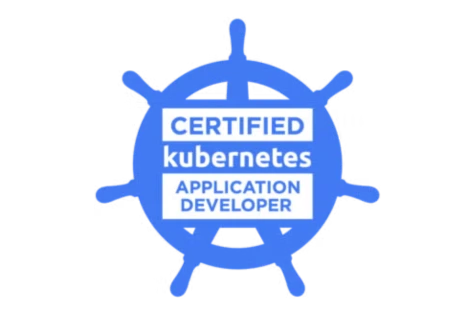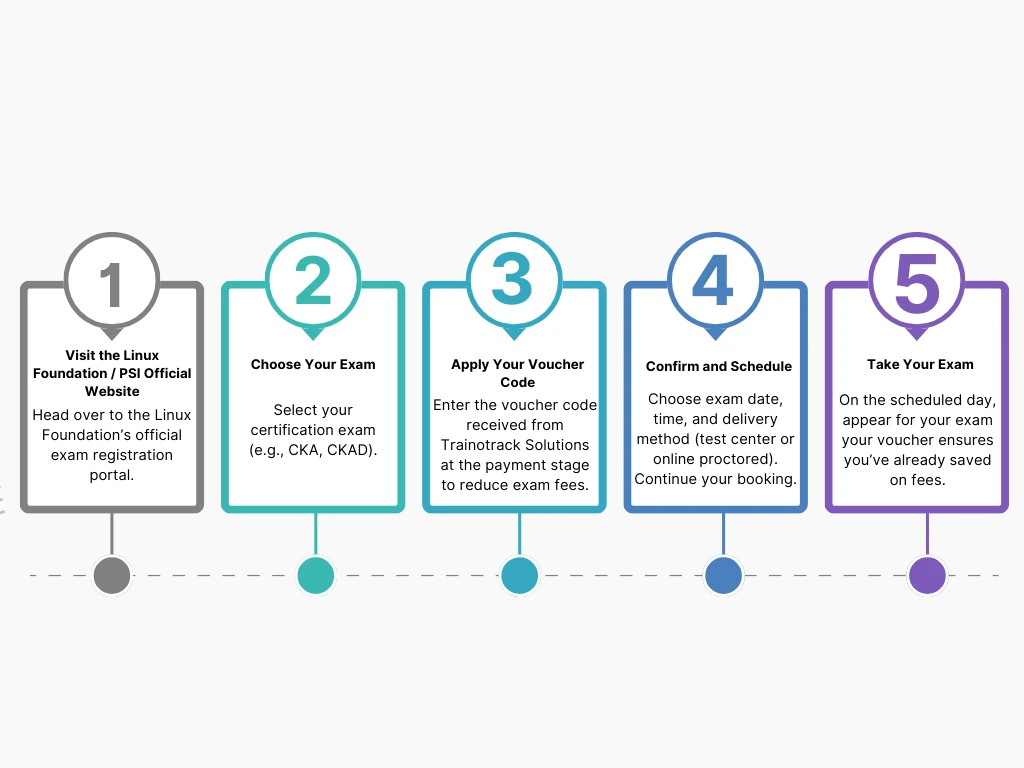
Certified Kubernetes Administrator - CKA
Certification validating skills in administering Kubernetes clusters and workloads.
- Actual Price
- Our Price

Certified Kubernetes Application Developer - CKAD
Proves ability to design, build, and run Kubernetes applications.
- Actual Price
- Our Price
Linux Foundation Certifications
Linux Foundation certifications are among the most widely recognized qualifications in the open-source and cloud-native ecosystems. In case you are starting your IT journey, or better still, a DevOps and cloud career, Linux Foundation certifications are your expertise proofs and open doors for you globally.
To make your Linux Foundation certification registration more convenient, Trainotrack Solutions is providing official Linux Foundation exam vouchers. As a reseller, we guarantee that purchases can be made safely, with more flexible schedules, and with 100% genuine vouchers. What is more, by using Linux Foundation exam vouchers, you not only save part of your fees but also enjoy the flexibility to “buy now” and “schedule later,” which means that your preparation is totally up to you.
Trainotrack Solutions is the provider of genuine vouchers for the major certifications, such as CKA (Certified Kubernetes Administrator), CKAD (Certified Kubernetes Application Developer). The Linux Foundation exam vouchers are the best option for professionals, students, and organizations that are looking for the most affordable certification solutions without any extra costs.
Linux Foundation Certification List
| Certification | Certification Code | Certification Description |
|---|---|---|
| Certified Kubernetes Administrator | CKA | Test skills in Kubernetes cluster installation, configuration, and management. |
| Certified Kubernetes Application Develope | CKAD | Validates ability to design, build, and run applications on Kubernetes. |
Career Benefits
Linux Foundation certifications are among the most reliable credentials worldwide, which validate the skills in open source, Linux administration, Kubernetes, and cloud-native technologies. They are highly recognized by top employers, enterprises, and academic institutions and thus make a strong base for building a successful IT career.
In contrast to vendor-specific certifications, Linux Foundation credentials concentrate on vendor-neutral, community-driven skills. This means that your knowledge can be used across different platforms, technologies, and industries, which in turn makes you a versatile and highly sought-after professional in today's rapidly changing tech ecosystem.
Besides the increased employability and credibility during the hiring process, the Linux Foundation certifications also facilitate access to foreign opportunities, higher-paying positions, remote work options, and career advancement. Considering that the open-source ecosystem is the main driver of modern technology, these certifications are like your professional growth gateway to the future.
Why Do Linux Foundation Certifications Need?
Among Indian IT companies, certifications from the Linux Foundation are considered to be the topmost valuable credentials in open-source technologies. Certified professionals get the ticket to the most well-paid positions in big IT companies, consulting firms, and startups. Organizations are putting great effort into looking for Linux-certified professionals to run Linux systems, manage Kubernetes environments, cloud-native platforms, and DevOps pipelines.
Across the world, Linux Foundation certifications are admired by the top-listed multinational corporations. Recognition of these kinds of certifications opens the gate for specialists to find jobs abroad or work remotely for global corporations. The certifications are equally beneficial for IT-savvy people who want to start their career and experienced professionals who want to stay abreast of industry changes in open-source and cloud-native technologies.
Furthermore, Linux Foundation certification undoubtedly leads to career advancement; however, it also contributes to the building of a strong personal brand in the global tech community. Those who possess them receive not only the promotion but also the recognition of their qualifications as open-source contributors.
The Linux Foundation likewise provides a very explicit and well-organized certification roadmap—from fundamental system administration to technologically advanced Kubernetes safety, cloud engineering, and DevOps automation. By this, the career development can be easily mapped out stepwise from being a beginner to getting specialized in high-demand domains.
Why Choose Us?
You don’t need to pay for the full exam fees. With Trainotrack, you can purchase official Linux Foundation exam vouchers at discounted prices and save more on certifications.
Here’s why customers choose us:
- Authorized & Genuine – 100% official Linux Foundation exam voucher with verified security.
- Discounted Pricing – Save on exam costs compared to standard fees.
- Bulk Orders – Special offers for institutions, corporates, and training centers.
- Student Discounts – Dedicated pricing for universities and colleges
- Freelancer-Friendly – Affordable vouchers for independent professionals.
- Flexible Scheduling – Buy now and register later when you're ready.
- Quick Delivery – Voucher codes sent instantly via WhatsApp or Email.
Linux Foundation Certification Cost Comparison
| Certification Name | Actual Price | Our Price | Save | Discount |
|---|---|---|---|---|
| CKA |
|
|||
| CKAD | ₹XXXXX | ₹XXXXX | ₹XX% OFF | ₹XX% OFF |
How to Buy Voucher?
- Pick out Your Voucher
- Contact Our Sales Team
- Secure Payment
- Receive Your Voucher
From the Linux Foundation certifications list (CKA, CKAD), select the exam voucher that best fits your career path.
Get in touch with our sales team via phone or email. Share your requirements, and they will answer all your queries in detail.
Complete your payment safely with full support from our team. If you face any issues, our staff will help instantly.
Once your payment is confirmed, your Linux Foundation exam voucher code will be delivered instantly via WhatsApp or Email.

How to Use The Linux Foundation Exam Voucher?
-
Visit the Linux Foundation / PSI Official Website
Head over to the Linux Foundation’s official exam registration portal.
-
Choose Your Exam
Select your certification exam (e.g., CKA, CKAD).
-
Apply Your Voucher Code
Enter the voucher code received from Trainotrack Solutions at the payment stage to reduce exam fees.
-
Confirm and Schedule
Choose exam date, time, and delivery method (test center or online proctored). Continue your booking.
-
Take Your Exam
On the scheduled day, appear for your exam—your voucher ensures you’ve already saved on fees.

Frequently Asked Questions

CKA (Certified Kubernetes Administrator): $395 approx.
CKAD (Certified Kubernetes Application Developer): $395 approx.
• Linux System Administrator
• Cloud Engineer
• DevOps Engineer
• Site Reliability Engineer (SRE)
• Kubernetes Administrator
• Security Specialist
These jobs are in high demand across startups, IT firms, and multinational corporations.
• System Administrator roles in IT companies
• DevOps and Cloud Engineering positions in enterprises
• Kubernetes-focused roles in startups and MNCs
• Security and Infrastructure management in the financial, telecom, and government sectors